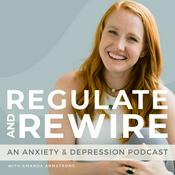Do you ever finish a conversation and realize you’ve just given a twenty-minute dissertation to justify a simple "no" or a basic need? In this episode, we’re peeling back the layers on chronic over-explaining. It turns out, this isn't just a quirky personality trait—it’s a sophisticated nervous system response. Whether you’re trying to preemptively defend yourself against being "the bad guy" or you learned early on that your needs weren't valid unless you built a legal case for them, this episode offers a roadmap to reclaiming your voice.
In this episode, you’ll learn:
The "Origin Story" of Over-Explaining: Why we learn to justify our needs to get them met and how misattunement in childhood creates a blueprint for hyper-communication.
Over-Explaining as a Survival Tool: The science of how your amygdala flags "emotional risk" and tries to negotiate safety through a flood of information.
The High Cost of Justification: How over-explaining leads to emotional exhaustion, self-abandonment, and the weakening of your own self-trust.
The "One-Sentence Rule": A practical challenge to state your truth clearly and then—the hardest part—stop talking.
Embracing the Pause: Why silence feels like danger to a dysregulated nervous system and how to tolerate the "awkwardness" of letting your words land.
3 Takeaways:
Over-explaining is a nervous system response, not a personality flaw. If you had to prove your feelings were valid in the past, your brain adapted by explaining itself into safety. You’re not "too much"; you’re practicing a survival skill that you no longer need.
The cost of over-explaining is self-abandonment. When you lead with a defense, you’re inadvertently saying your needs aren't legitimate on their own. Trusting your truth means realizing your "no" doesn't require a dissertation.
Practice the "One-Sentence Rule" and embrace the pause. Challenge yourself to say what you need in one clear sentence, then stop. Let the silence be there. People who truly see you don't need an essay to respect your boundaries.
—
Looking for more personalized support?
Book a FREE discovery call for RESTORE, our 1:1 anxiety & depression coaching program (HSA/FSA eligible & includes comprehensive bloodwork)
Join me inside Regulated Living, a mental health membership and nervous system healing space (sliding scale pricing available)
Order my book, Healing Through the Vagus Nerve today!
*Want me to talk about something specific on the podcast? Let me know HERE.
Website: https://www.regulatedliving.com/podcast
Email:
[email protected]Instagram: @amandaontherise
TikTok: https://www.tiktok.com/@amandaontherise



